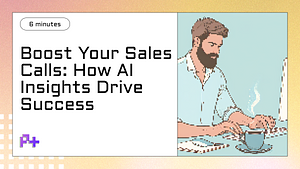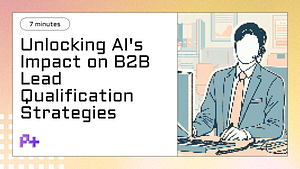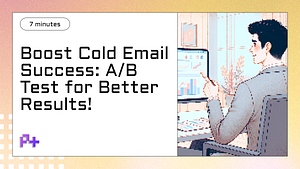Summary
- 1. The Evolution of B2B Lead Generation: Embracing AI Technologies
- 2. How AI is Transforming Lead Qualification: Strategies and Best Practices
- 3. The Role of Generative AI in Enhancing the Buyer Journey
- 4. Overcoming Challenges in AI-Powered Lead Generation
- 5. Future Trends: The Next Frontier of AI in B2B Marketing
1. The Evolution of B2B Lead Generation: Embracing AI Technologies
The landscape of B2B lead generation has undergone significant transformation over the past few years, primarily driven by advancements in artificial intelligence (AI) technologies. Traditionally, lead generation relied heavily on manual processes and subjective assessments, often leading to inefficiencies and missed opportunities. However, with the introduction of AI solutions, businesses can now harness data analytics, machine learning, and automation to streamline their lead qualification processes. This evolution not only enhances the accuracy of identifying high-quality leads but also allows organizations to allocate their resources more effectively, ultimately driving higher conversion rates.
AI technologies are revolutionizing B2B lead qualification by providing insights into customer behavior and preferences. Through predictive analytics, businesses can analyze vast amounts of data to identify patterns and trends that indicate a lead's likelihood of conversion. For example, AI can evaluate engagement metrics, such as email open rates and website interactions, to score leads based on their readiness to buy. This data-driven approach enables sales teams to focus their efforts on leads that are more likely to convert, thereby increasing efficiency and reducing the time spent on unqualified prospects. As a result, companies can experience improved sales outcomes and a better return on investment.
Moreover, the integration of AI in B2B lead generation has facilitated the automation of repetitive tasks, allowing sales and marketing teams to concentrate on strategic initiatives. Chatbots, for instance, can engage potential leads in real-time on websites, answering inquiries and qualifying prospects before they even reach a sales representative. This not only enhances the customer experience but also ensures that leads are nurtured throughout their buyer's journey. As businesses continue to embrace AI technologies, the impact on B2B lead qualification will only deepen, paving the way for more personalized and effective marketing strategies that resonate with target audiences.
2. How AI is Transforming Lead Qualification: Strategies and Best Practices
Artificial Intelligence (AI) is revolutionizing the way businesses approach B2B lead qualification, fundamentally changing strategies and enhancing best practices. By leveraging AI-driven tools, companies can analyze vast amounts of data to identify potential leads with precision and speed. Machine learning algorithms can assess patterns in customer behavior, engagement levels, and demographic information, allowing businesses to prioritize leads that are most likely to convert. This data-driven approach not only streamlines the qualification process but also significantly improves the quality of leads in the sales pipeline.
One of the most effective strategies for implementing AI in lead qualification is through predictive analytics. By utilizing historical data, AI systems can predict which leads are more likely to result in successful sales. This involves integrating CRM systems with AI tools that analyze past interactions and conversion rates to score leads based on their likelihood to engage and purchase. Additionally, natural language processing (NLP) can be used to analyze communication with leads, whether through emails, chatbots, or social media interactions, enabling businesses to tailor their outreach strategies effectively. This targeted approach ensures that sales teams focus their efforts on leads that align closely with their ideal customer profiles.
Best practices for utilizing AI in B2B lead qualification include continuous monitoring and optimization of AI systems. Businesses should regularly update their algorithms and data inputs to reflect changes in market conditions and customer preferences. Moreover, combining AI insights with human intuition can enhance decision-making processes, as sales teams can use their expertise to interpret AI-generated insights. Training and development in AI tools for sales personnel are also crucial, ensuring that teams are well-equipped to leverage technology effectively. By embracing these strategies and best practices, businesses can harness the full potential of AI to transform their lead qualification processes, ultimately driving higher conversion rates and improved sales performance.
3. The Role of Generative AI in Enhancing the Buyer Journey
As businesses increasingly leverage technology to optimize their operations, generative AI emerges as a transformative force in enhancing the buyer journey. One of the crucial areas where AI impacts B2B lead qualification is through personalized customer interactions. By analyzing vast amounts of data, generative AI can identify patterns in buyer behavior, preferences, and pain points, enabling businesses to tailor their outreach strategies. This level of personalization not only increases engagement rates but also builds trust with potential clients, making them more likely to progress through the sales funnel.
Moreover, generative AI streamlines the content creation process for marketing teams. By generating targeted content—such as emails, blog posts, and social media updates—that resonates with specific buyer personas, businesses can efficiently nurture leads at various stages of the buyer journey. This capability allows organizations to maintain consistent communication with prospects, providing them with valuable information that addresses their specific needs and challenges. As a result, potential customers feel more informed and supported, which enhances their overall experience and increases the likelihood of conversion.
Finally, generative AI plays a crucial role in predictive analytics, enabling businesses to forecast future buyer behavior and outcomes. By interpreting data trends and historical sales patterns, AI tools can assist sales teams in prioritizing leads that are more likely to convert. This focus on high-potential leads not only optimizes the allocation of resources but also enhances the efficiency of the sales process. In essence, the integration of generative AI into the lead qualification process significantly improves the buyer journey, ensuring that businesses can effectively engage with prospects and drive conversions in a competitive B2B landscape.
4. Overcoming Challenges in AI-Powered Lead Generation
As businesses increasingly adopt AI technologies for B2B lead qualification, they encounter several challenges that can hinder the effectiveness of their lead generation efforts. One significant hurdle is the quality of data fed into AI systems. AI algorithms rely heavily on data to learn and make informed decisions. If the input data is incomplete, outdated, or biased, the AI's ability to accurately identify high-quality leads diminishes. To overcome this challenge, companies must invest in robust data management practices, ensuring that their datasets are clean, relevant, and representative. This includes regular audits of data sources, as well as integrating multiple data streams to enhance accuracy.
Another challenge lies in the integration of AI tools with existing sales processes and technologies. Many organizations struggle to harmonize AI-powered solutions with their traditional methods, leading to resistance from sales teams who may feel threatened by automation. To address this issue, it's crucial for businesses to foster a culture of collaboration between AI technologies and human expertise. Training sessions and workshops can help sales staff understand how AI can complement their efforts rather than replace them. By demonstrating the capabilities of AI in enhancing lead qualification processes, companies can encourage acceptance and utilization of these tools across their teams.
Lastly, ethical considerations surrounding AI in lead generation must not be overlooked. Issues such as data privacy and transparency can lead to distrust among potential leads and customers. Companies need to implement ethical guidelines for AI use, ensuring compliance with regulations like GDPR. Clear communication with prospects about how their data will be used and the benefits of AI-powered lead qualification can also alleviate concerns. By addressing these ethical challenges head-on and maintaining transparency, businesses can build trust and improve their overall lead generation outcomes while effectively leveraging AI technology.
5. Future Trends: The Next Frontier of AI in B2B Marketing
As businesses continue to evolve in the digital landscape, the future of AI in B2B marketing, particularly in lead qualification, is set to redefine how companies identify and nurture potential clients. One of the most significant trends is the integration of machine learning algorithms that can analyze vast amounts of data in real-time. This capability allows businesses to refine their lead qualification processes by predicting which leads are most likely to convert based on historical data and behavioral patterns. By leveraging AI tools, marketers can prioritize their outreach efforts, ensuring that resources are allocated efficiently to leads with the highest potential, ultimately increasing conversion rates and ROI.
Another trend gaining momentum is the use of AI-driven predictive analytics, which provides valuable insights into customer behavior and preferences. By analyzing data from various touchpoints—such as website interactions, email engagement, and social media activity—AI can help businesses create more personalized marketing strategies. This level of customization not only enhances the lead qualification process but also fosters stronger relationships with prospects. As a result, companies can deliver targeted content and solutions that resonate with their audience, making the marketing efforts more effective and relevant.
Lastly, the evolution of natural language processing (NLP) is set to revolutionize how businesses interact with leads. AI tools equipped with NLP capabilities can engage in meaningful conversations with potential clients through chatbots and virtual assistants, providing instant responses to inquiries. This not only improves the customer experience but also allows for the collection of valuable data during these interactions, further refining the lead qualification process. As B2B marketers embrace these advancements, the future of AI in lead qualification looks promising, with the potential to enhance efficiency and effectiveness in identifying and nurturing leads in an increasingly competitive market.



